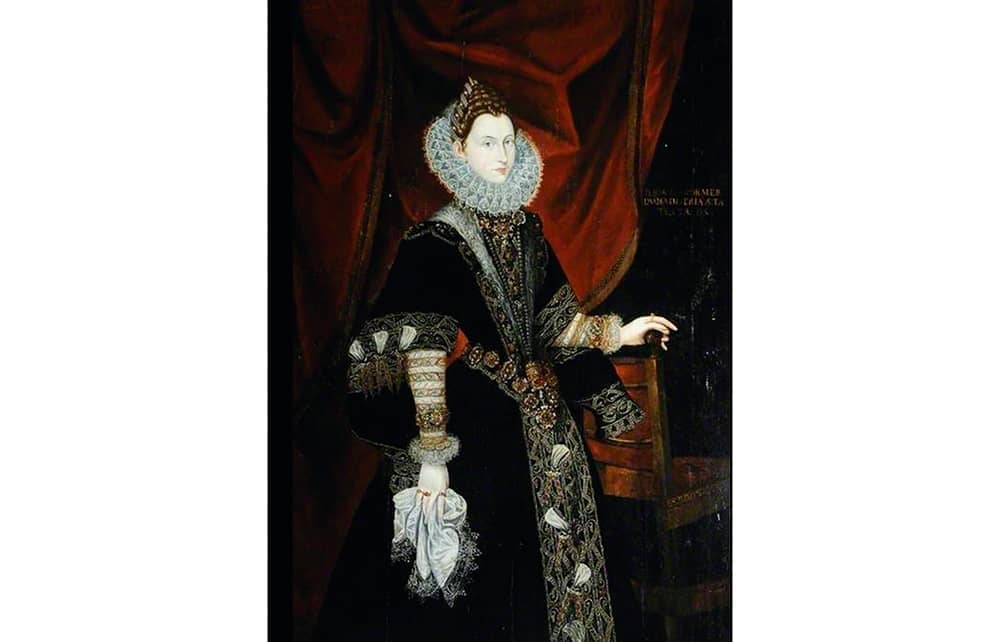Thomas Cromwell’s biographer Diarmaid MacCulloch once told me that my father’s family, the Dormers, had been servants of the great enforcer of Henry VIII’s Reformation. This may have been a tease. It is a matter of family pride that Jane Dormer’s great- uncle, the Carthusian monk Sebastian Newdigate, was executed for refusing to accept the Royal Supremacy. Jane, Duchess of Feria (1538-1612), was named after his pious sister, her grandmother.
Most of Jane Newdigate’s Dormer descendants remained stubbornly Catholic over the centuries of persecution that followed, but they were never aggressive about it. Under Elizabeth I, the Dormers paid fines as recusants rather than attend Church of England services, and hid priests so they could hear the banned Catholic Mass. Mainly, they just kept their heads down.
Jane was different. Though a mere daughter (and such creatures not ‘family’, according to one of my male relatives), she is remembered as Dormer rather than Suarez de Figueroa, because, as Simon Courtauld’s biography shows, she was one of the most colourful figures of the Tudor era. As an English Catholic, she went nose to nose with Elizabeth I, channelling something of the spirit of her dead mistress, Mary I. Her father, Sir William Dormer, had been made a Knight of the Bath on Mary’s accession, as a reward for resisting the pretensions of Lady Jane Grey, the ‘Nine Days’ Queen’. His 16-year-old daughter attended on the Catholic queen at her coronation as one of her maids of honour.
Jane married in 1558 without royal consent, and it wasn’t long before she was making trouble for the Queen
Jane was soon known as a beauty: ‘Dormer is a darling, and of such lively hue/ That whoso feeds his eyes on her may soon her beauty rue,’ wrote the poet Richard Edwards. She was also judged efficient and trustworthy. It was Jane who was instructed to carry Mary’s jewels to Elizabeth on her mistress’s death.
The future for Catholics in England looked bleak under Anne Boleyn’s daughter. But Jane had already caught the eye of the Count (later Duke) of Feria, the Spanish ambassador and representative of Mary’s widower Philip II. They married without royal consent in December 1558, only weeks into the new reign – and it wasn’t long before Jane was making trouble for the Queen.
She passed messages from Lady Katherine Grey – the heir to the throne under the standing Act of Succession – to Feria, who plotted to remove Katherine from the country. Courtauld believes that Jane wasn’t involved in what he terms a ‘bizarre plan’, but in fact it posed a real threat, as Elizabeth well understood. She both detested Katherine and feared her claim.
The younger sister of the executed Nine Days’ Queen was destined to die under house arrest in 1568. This was shortly before Elizabeth’s heir in blood, Mary, Queen of Scots, fled to England from Scotland, and was also imprisoned. Jane Dormer had already left for Spain in 1559. She was heavily pregnant at the time, but at her parting audience with Elizabeth, she was kept waiting, standing for hours. Courtauld ascribes this act of cruelty to William Cecil, convinced that the two women remained on reasonable terms. He notes that Elizabeth and Jane exchanged warm letters. When Jane had her baby in the Low Countries, the Queen sent her ‘hearty commendations’. In another letter Elizabeth signed herself as Jane’s ‘Sovereign and friend’. Jane in turn was said to be ‘always a kind lady to the Queen’.
I fear, however, that this was a case of keeping your enemies close. Jane had Catholic relations in England who were vulnerable to the Queen’s displeasure. Elizabeth, meanwhile, had to consider that Jane’s husband was Philip II’s most prominent adviser on English affairs. Jane could also be useful. She frequently helped Englishmen who got themselves into trouble in Spain (among them Elizabeth’s admiral Sir Richard Hawkins). She made it her business to be on good terms with English ambassadors, with whom she bonded over the little things from home they missed. She had cheese and butter sent over from England. The Ferias also, however, protected and aided English and Irish Catholic exiles and helped set up the Jesuit training colleges that sent highly effective missionary priests back to England.
After Feria died in 1571 Jane became still more important to the exile community. She involved herself in schemes to invade Ireland, and sent money to Mary, Queen of Scots, who she had met in France on her progress to Spain from England. The Queen of Scots attempted to persuade Philip to make Jane governor of Flanders, where there were also numerous English exiles.
Instead, she was destined to see the invasion of Ireland end in a horrific massacre and Mary, Queen of Scots beheaded. She never returned to Flanders, and her last days were spent in Spain, restoring convents and writing letters to Elizabeth’s successor, James I, in the hopes she could return home. But he had little affection for Jesuits, and was unsympathetic.
She asked, finally, for her heart to be buried in England. It’s unlikely the request was ever carried out but, thanks to Courtauld’s colourful and witty biography, this rather overlooked Tudor woman will be better known in her homeland as one of the most significant women of 16th-century Europe.






Comments